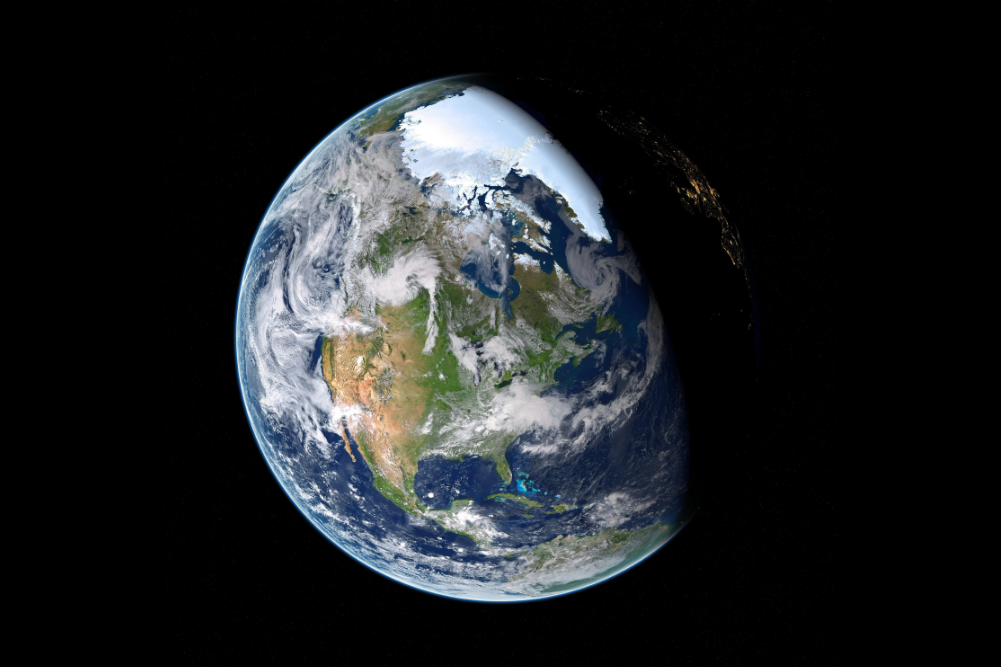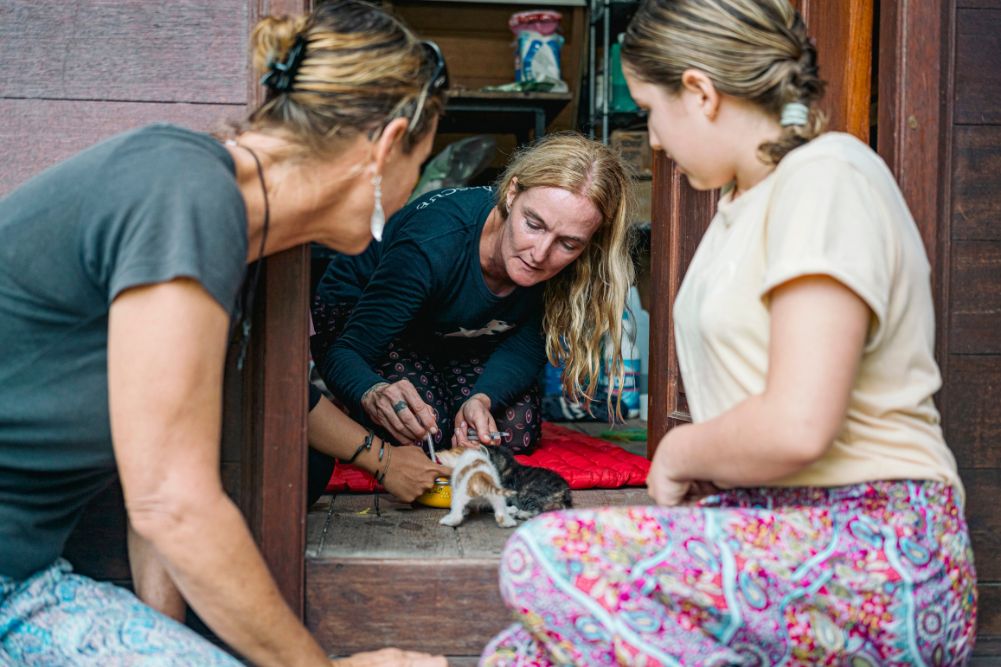Lighting the way to global change, clean energy and climate action
Australian entrepreneur Katerina Kimmorley’s pioneering work has made a significant difference to global poverty and climate change. We speak to her about providing solar lighting to slum communities across India and Nepal, how Australia can become a clean superpower in the energy sector and so much more.
It’s a simple idea: provide solar lights for poor families in the slums of India so they can stop using dangerous kerosene lamps at night and save the environment. For many idealistic entrepreneurs, that would be the end of the idea. Not for Katerina Kimmorley, who is the co-founder of Pollinate Energy and a climate and sustainability investor. For Kimmorley, what started out as lights for the poor became a mission to turn the light on for women around the globe.
Lights on
As a child, Kimmorley grew up in one of Australia’s most beautiful coastal areas: the northern beaches of NSW. Life was good; she’d go to university, perhaps she’d do medicine? A good student with a flair for the sciences, everything was possible. Until she saw something very different on the horizon.
“Growing up on the northern beaches we always used to look out over the skyline and out across the ocean. It was a big part of our upbringing. I remember one day, my dad looking out and getting quite emotional — he never got emotional, he was this tough surfie guy — about all the coal ships on the horizon, all lined up waiting for Newcastle and Wollongong. I remember him looking at them and saying, ‘That’s going to ruin our paradise.’ Seeing my Dad emotional like that really shook me up.”
It was as if a light had been switched on inside her.
The answer, she decided, as she considered her direction of study at university, was solar power, or photovoltaics. At the time, Australia was the best in the world in this area, so Kimmorley began her studies. If Australia could develop an alternative to the coal ships her Dad had seen on the horizon, perhaps things could be different.
What started out as lights for the poor became a mission to turn the light on for women around the globe.
Soon, however, it became obvious (as it would a number of times in her career) that the technology was not enough. It needed funding. It needed policy and support. So she switched her focus to include commerce and liberal studies so she could learn “the language of moneymakers and policy people”, eventually gaining an honours degree in energy economics at the University of Edinburgh, and then on to the London School of Economics for her masters and PhD.
“I knew I wanted to be in engineering and solar energy and build a new energy future, but as I studied and learned more, it became linked with a real humanitarian focus on poverty and climate change, too. I realised that you can’t solve one if you can’t solve the other. And as my career developed that became more omnipresent until I had an opportunity to really explore what that means — in the most basic way at first — by going to India.”
Coming out of the dark
Life is very real in India. It may be possible to dream of change when inside an economics class in London or Sydney, but to live day in and day out alongside the slums of India is a different thing.
“We went to India to help a friend who had set up a charity to raise money to build an orphanage in Bangalore. My friend built the orphanage with the funds raised, but the children couldn’t study because they didn’t have access to lights. As I was working in renewable energy at the time, I knew there was an opportunity for me to help out the orphanage.
“It really was so simple; Australia was great at photovoltaics. I just wanted to get lots of those solar lights to people who needed it so they could have a stepping stone to having a constant source of renewable energy. And prove that if you could do it in India, you could do it anywhere!
“It was a totally humbling experience. We were so idealistic. The reality of life in a slum, which we did for nearly five years, was a real reality check. For the first period I was there, I was doing my masters research and was really involved living next to those slum communities, and it started out really philosophical about poverty and climate change and all the big ideas, but within a few days it became mainly about the women.”
To date, Pollinate Group has trained more than 650 women, has reached 630,000-plus people and saved 65,000 tonnes of CO2 emissions.
Conditions in these slums are often unfit for people to live in, and their basic needs, like access to clean water and lighting, are missing. Many of these slums are not connected to grid electricity or mains water supply, forcing people to go without, or to resort to unsafe products. Families rely on harmful kerosene for their lighting needs, they drink unclean water and cook with dirty cookstoves.
“The families all live in these little tents no bigger than your dining room table, and all they want is a better life for their children,” she says. “The women knew the kerosene smoke was killing them and their children and they knew they wanted their children to study at night.”
It was then that Kimmorley’s work became so much more than providing solar energy.
“One of the first women I met and worked with in the slum communities was a woman called Lolita. She’d wake at 4am to defecate outside before the sun rose because she had to do it out in the open before anyone could see her. Then she’d come back and cook for four hours for her family, which included her husband, her two children who were two and a newborn, and both of her parents-in-law. And then she’d go to work and carry bricks and rocks on her head for a construction site, six days a week.
“Then she’d go back home and cook for everyone again and then try and educate her children but, by then, it would be dark, and they didn’t have any light, so she would use kerosene,” Kimmorley explains. “And I remember she said to me ‘Life is really hard for women who get left in the dark.’”
Lolita was only 14 years old. She asked Kimmorley to help her find a solution.
More than just lights
In 2012, Pollinate Energy was established, which set up networks of micro-entrepreneurs to distribute sustainable technology (like solar lights and clean cookstoves) on payment plans to India’s urban poor.
Earlier, Kimmorley’s research had been focused on what people could afford to pay for solar, but with the experience of the slums and women like Lolita, they needed a new model.
“At first, we thought that solving this energy need would simply be a matter of rolling out a technology solution. But we quickly realised it wasn’t a technology problem. There were plenty of existing solar lighting solutions available. The problem was, we had no distribution or financing mechanism in place to enable us to implement our solar light solution.
“Climate is like a global pandemic in the sense that it’s something we all need to share; we all need to chip in together and learn from each other.”
“We also realised, if we could raise enough money to give away a hundred or maybe even a thousand solar lights, that would be good. But with that same amount of capital we could sell these lights to the same people with a no-interest loan and repayments of the same amount as they were paying for kerosene each week, then they would pay it off within five weeks and own it for 20 years. Then, we could recycle that money to reach tens of thousands of people in the end. It was a sustainable business model that would allow us to have way more impact than just a donation model.”
And so Kimmorley and her team approached various microfinancing organisations in India but were repeatedly knocked back, as these microfinancers considered people living in slums to be “too poor” and “too risky” to deal with.
“This led us to realise we had to provide a whole end-to-end solution, which was technology, distribution and financing — essentially, three businesses in one. It took a lot of trial and error, but that’s how we developed Pollinate Energy.”
Included in that business model was also the training and support for women like Lolita to be a part of the business itself.
Pollinators, as they are known, are entrepreneurs recruited from the urban poor who sell Pollinate’s solar lanterns, improved cookstoves, solar fans and water filters to families living in slum communities. This face-to-face distribution network allows the organisation to build relationships and trust with its customers, and, as Kimmorley had hoped, breaks the cycle of poverty for women.
“It was amazing. We wanted to make sure what they were doing was the best that they could do, so they could have an income and a sustainable economic future as well as a sustainable environmental and health future. I couldn’t bear the thought of any of them not having an income. So it started very philosophical, but became very practical very quickly.”
To date, Pollinate Group has trained more than 650 women, has reached 630,000-plus people and saved 65,000 tonnes of CO2 emissions.
Light up the world
Was this enough? For the girl on the beach with her Dad, was this enough? Turns out it wasn’t.
“I realised that our business was very lucky. We had the same amount of growth as Uber, which launched the same year we did, because we had a disruptor model which was enabled by a mobile phone. And it was a need that needed to be served. What we really needed now was tens of thousands of businesses like ours.”
So, on a trip back to Australia, Kimmorley heard of the Australian Government’s announcement of the Innovation Fund which, at the time, was the world’s biggest funding for clean technology (or cleantech for short). She knew it was time to leave her beloved India.
“Coming back home to Australia was a huge cultural shock. The culture, the people, the depth of that country is so profound. But I decided that I didn’t just want to help not just one or even 10 businesses like ours get off the ground … I wanted to help tens of thousands of businesses.”
Over the past three years, Kimmorley has been involved in looking at the up-and-coming cleantech industries and ideas in Australia and how they can change things, not only here but in Asia and the world, too. She’s also recently stepped down from her executive role with Pollinate Energy, in preparation for maternity leave.
In her role with the Innovation Fund, she is part of the process that decides which cleantech businesses in Australia to invest in and brings not only her vast understanding from her own experience in India, but also all that “language of moneymakers and policy people”.
Kimmorley says the outbreak of COVID-19 in early 2020 has brought the reality of a global crisis right to our front doors.
“I had dengue fever when I was in Bangalore, India, and was in hospital and rehab for six months. I have never been so sick. Thirty per cent of Bangalore’s population has dengue fever every mosquito season which, with a population of over 10 million people, is a lot of people. But the important thing here is that Bangalore didn’t have dengue fever 10 years ago because it didn’t have the climate for the mosquitoes. But, with climate change, the mosquitoes are now there.
“I think a lot of Western countries like the United States and Europe as well as Australia have been quite insulated over the years from the spreadable effects of climate change, other than natural disasters. But it does have health effects, not just environmental, and maybe now we’ve seen a global pandemic, this threat will become more real.
“Climate is like a global pandemic in the sense that it’s something we all need to share; we all need to chip in together and learn from each other. We need to try lots of things and innovate together. What happens on the other side of the world can and does affect us here in Australia — and that’s an important realisation. We really are all in this together.”
So what can we all do in our own lives to turn the light on? According to Kimmorley, you’re more empowered than you realise.
“The way we encourage entrepreneurs and investments through our superannuation is incredibly important. We don’t realise that every single person in Australia has so much power with their superannuation and what they do with it. There are so many ways we can effect change, but we’ve often felt disconnected from it. We can all use what we have to support those with talents and expertise in the areas of cleantech and change. We must.”








